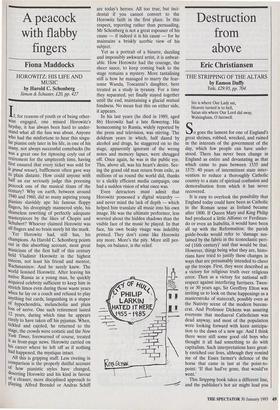A peacock with flabby fingers
Fiona Maddocks
HOROWITZ: HIS LIFE AND MUSIC by Harold C. Schonberg Simon & Schuster, f20, pp. 427 If, for reasons of youth or of being other- wise engaged, one missed Horowitz's heyday, it has always been hard to under- stand what all the fuss was about. Anyone who had the misfortune to hear this singu- lar pianist only later in his life, in one of his many, not always successful comebacks (he Was a great one for tiptoeing coyly out of retirement for the umpteenth time, having first ensured that every ticket was sold for le grand retour), bafflement often gave way to plain distaste. How could anyone with half an ear seriously judge this preening Peacock one of the musical titans of the century? Why on earth, between around 1940 and 1960, did so many aspiring young Pianists slavishly ape his famous floppy fingers, his droopingly mannered style, his shameless rewriting of perfectly adequate masterpieces by the likes of Chopin and Schubert? Whoever claimed Horowitz was all fingers and no brain surely hit the mark.
Yet Horowitz had, still has, his champions. As Harold C. Schonberg points out in this absorbing account, most great musicians of the first half of this century held Vladimir Horowitz in the highest esteem, not least his friend and mentor, Rachmaninov. And he surely knew. The world lionised Horowitz. After leaving his native Russia as a young man, he quickly acquired celebrity sufficient to keep him in stretch limos even during those waste years when he lay on a couch and refused to play anything but cards, languishing in a stupor of hypochondria, melancholia and plain loss of nerve. One such retirement lasted 12 years, during which time he appears rarely to have taken off his pyjamas. When, tickled and cajoled, he returned to the stage, the crowds were ecstatic and the New York Times, forewarned of course, treated it as front-page news. Horowitz carried on his career where he left off as if nothing had happened, the mystique intact.
All this is gripping stuff. Less riveting in comparison is the properly dutiful account of how pianistic styles have changed, deserting Horowitz and his kind in favour of a cleaner, more disciplined approach to Playing. Alfred Brendel or Andras Schiff are today's heroes. All too true, but inci- dental if you cannot convert to the Horowitz faith in the first place. In this respect, reporting rather than persuading, Mr Schonberg is not a great espouser of his cause — if indeed it is his cause — for he maintains a briskly acerbic view of his subject.
Yet as a portrait of a bizarre, dazzling and impossibly awkward artist, it is unbeat- able. How Horowitz had the courage, the sheer sauce, to keep coming back to the stage remains a mystery. More tantalising still is how he managed to marry the fear- some Wanda, Toscanini's daughter, here treated as a study in tyranny. For a time they separated, yet finally stayed together until the end, maintaining a glacial mutual fondness. No mean feat this on either side, it appears.
In his last years (he died in 1989, aged 86) Horowitz had a late flowering. His homecoming to Russia, widely reported by the press and television, was stirring. The doldrum years in which, half dazed by alcohol and drugs, he staggered on to the stage, apparently ignorant of the wrong notes and memory lapses, were shrugged off. Once again, he was in the public eye. This, above all, was his heart's desire. See- ing the grand old man return from exile, as millions of us round the world did, thanks to a slickly efficient media campaign, one had a sudden vision of what once was.
Even detractors must admit that Horowitz possessed a digital wizardry and never mind the lack of depth — which helped him translate all music into his own image. He was the ultimate performer, less worried about the hidden shadows than the visible face of the music he played. In that face, his own beaky visage was indelibly printed. They don't come like Horowitz any more. More's the pity. More still per- haps, on balance, is the relief.










































































 Previous page
Previous page